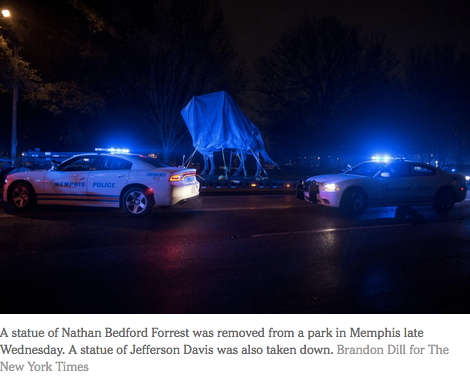MEMPHIS — Charlene Harmon and her fiancé, Victor Bryant, walked Thursday through a small park overlooking the Mississippi River, pleased by the view — and what it did not include.
“I feel a sense of relief,” said Ms. Harmon, 63, a retired nurse. “Finally, we can come down and really enjoy this park. And we don’t have to see something that reminds us of our painful past: the lynchings, and beatings, and the selling of our forefathers.”
A towering monument to Jefferson Davis, the president of the Confederacy, was removed from Memphis Park on Wednesday night, along with an even bigger equestrian statue of Nathan Bedford Forrest, a Confederate general and first grand wizard of the Ku Klux Klan, from a second park. Convinced the statues needed to come down, city leaders circumvented a state law preventing their removal by selling the parkland to a nonprofit group — a creative solution that Republican leaders of the Tennessee House branded as potentially illegal.
“We are governed by the rule of law here in Tennessee and these actions are a clear infringement of this principle and set a dangerous precedent,” Representative Glen Casada, the State House majority leader, and Ryan Williams, the Republican caucus chairman, said in a joint statement.
Members of the Sons of Confederate Veterans were equally upset, and have repeatedly threatened legal action. But much of Memphis, a city that is 64 percent black, saw the removals as essential as the city gears up to commemorate the 50th anniversary of the April 1968 assassination of the Rev. Dr. Martin Luther King Jr. at a downtown motel.




